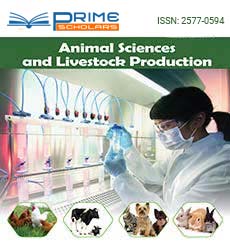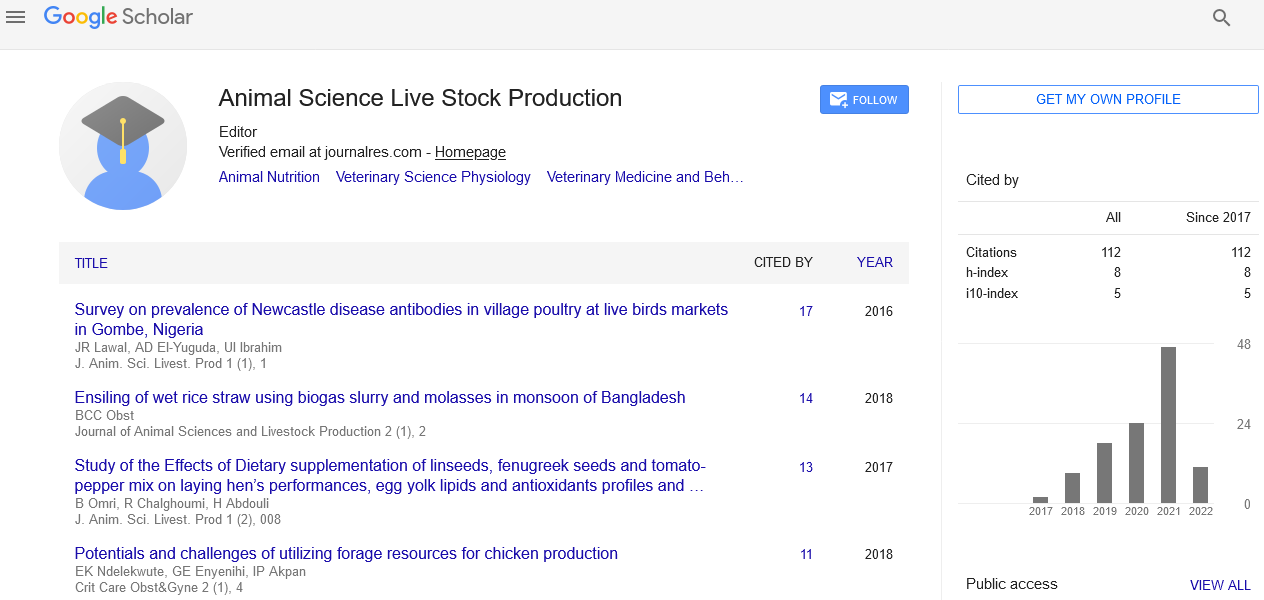Kholoud Osama Alawad Mohamed1; Intisar Yousif Turki1, Mohammed AlhadEbrahiem2*
1 Faculty of Animal Production and Technology, Sudan University of Science and Technology, Khartoum, Sudan.
2Department of Animal production, Faculty of Natural Resources and Environmental Studies, University of Kordofan, Elobied, Sudan.
- *Corresponding Author:
- Mohammed Alhadi Ebrahiem
Department of Animal production, Faculty of Natural Resources and Environmental Studies,University of Kordofan, Elobied, Sudan
E-mail:mahaali5656@gmail.com
Received Date: June 03, 2021;Accepted Date: September01,2021; Published Date: September11,2021
Citation: Ebrahiem M.A (2021) Effect of Supplemented Graded Levels of Clove Extract on broilers chick performance. J Anim Sci Livest Prod,Vol: 5,No:4
Keywords
weight gain, feed intake, broiler, feed conversion ratio.
Introduction
World poultry production has been steadily rising at the rate of 4% annually has become one of the most popular and visible enterprises in Sudan. Profitable poultry industry is always characterized by quick body gain and high egg production with less utilization of feed, according to the records in the Ministry of Animal Resources and Fisheries (2008) Poultry production was estimated to 45.6 million, reported that the modern commercial poultry industry in Sudan was started by the establishment of the Sudanese Kuwaiti Company 1979 and the Arab Sudanese Poultry Company in 1982- 1985 both were centered Khartoum. Then the poultry industry started to grow gradually around Khartoum and other towns in Sudan due to the rising demand for poultry products and the concurrent progress of animal feed industry and the activity of veterinary services.
The global poultry sector and future trends, and discusses the challenges the sector is facing, with particular emphasis on four areas: food security social challenges (poverty alleviation and equity), health (animal and human) and environment (natural resources and climate change).Poultry makes a substantial contribution to food security and nutrition, providing energy, protein, and essential micro-nutrients to humans, with short production cycles and the ability to convert a wide range of agro-food by-products and wastes into meat and eggs edible by humans. Poultry is the fastest growing agricultural sub-sector, especially in developing countries. Anne et al., (2017) .
Materials and methods
This experiment was conducted at Animal Production research center, Kuku to evaluate the effect of adding graded levels of clove extract on performance of broiler chicks.
This experiment carried out during autumn season (23 January _ 5 march 2019) The ambient temperature (20 _37 c).
PREPARATION OF CLOVE EXTRACTION
The cloves were prepared, cleaned, and amount of 1500 grams of a good quality clove were purchased, cleaned and prepared for the next use. Weighted ( 0 g - 250 g - 500 g and 750 g) of cloves were packing to adding in water through 5 weeks for groups A, B, C and D, respectively. Daily amount of clove was crushed by grinder and put in a glass and add boiling water to soak for 24 hours at a temperature of 40-50 degrees for 20-30 minutes and leave to be cool down, then add it to drinking water.
EXPERIMENTAL DIETS
The broiler chicks were fed the starter diets which were formulated to be iso-nitrogenous (24 % ) CP and semi iso-caloric (3100 Mcal/kg) After 22 days finisher a diet was formulated to be iso-nitrogenous (20% )CP and semi iso-caloric ( 3200 Mcal/ kg ) being adequate in all nutrients matching broiler chicks requirements (NRC, 1994) was offered to the chicks as finisher diets. Ration ingredients were sorghum, groundnut cake, concentrate methionine, lysine, salt, limestone and vegetable oil.
| Ingredient |
Starter 7-21 days |
Finisher 22-42 days |
| Sorghum |
63 |
70 |
| GNC |
30 |
24.2 |
| Limestone |
0.75 |
0.1 |
| DCP |
0.6 |
0.15 |
| Lysine |
0.2 |
0.1 |
| Methionine |
0.15 |
0.15 |
| Concentrate |
5 |
5 |
| Salt |
0.2 |
0.2 |
| Antifung |
0.1 |
0.1 |
| Blackberry ingredients |
Starter |
Finisher |
| Energy Mg/Kg |
12.97 |
13.39 |
| Protein |
23 |
19 |
| Ca |
1.1 |
1 |
| P |
0.5 |
0.5 |
| Ly |
1.12 |
1.12 |
Table1. percent inclusion rates (as fed basis) and calculated analysis (dry matter basis) composition of experimental diets.
HOUSING
Semi closed wire mesh _side poultry house was used. That was designed up to 5m in width and 15m in length with height 3m from the foundation to roof line. The house was constructed from corrugated metal sheets roof with law masonry walls set on concrete floor and wire mesh on the upper part of the walls providing good ventilation, with solid brick western eastern wall. The house was contained 20 pens partitioned with wire mesh 1m of each. Feed and water were provided adlibitum consumption during whole experimental period.
Light was provided approximately 24 hours light (natural/ artificial) for increasing feeding time 60-100 watt bulbs were used according to requirement . The density of birds was 10 birds/m2.
EXPERIMENTAL CHICKS
A total number of 200 birds (one day old) commercial unsexed broiler of Cobb500 bird were purchased from (Mico poultry company) and transported to the Animal Production Research Center. The live body weight of chick upon receipt was 45g.
The chicks were adopted to the premises and feed over 7days before the start of experiment .At the end of adaptation period, all chicks were weighted with an average initial weight of 135g.The chicks were then allotted randomly in to four treatments groups (A,B,C and D) in Completely Randomized Design (CRD), each group was divided in five replicates, each of 10 chicks .Ground brooding rearing system was adopted for 5weeks experimental period . chicks were bought vaccinated against (IB )and New Castle diseases (ND) at 3days of age through spraying, Gambaro disease at 14days of age through drinking water , retard Gambaro disease at 21days of age through drinking water and Newcastle disease at 28days of age soluble multi vitamin compounds (supper san ) were given during after vaccinated.
STATISTICAL ANALYSIS
The experimental design was completely randomized. Data generated from the experiment were subjected to analysis of variance (One –way-ANOVA) and the mean were tested for significance by least significant (LSD) using the statistical package of social science (SPSS) computer program. (Obi, 1990).
RESULTS
Response of broiler chicks to clove extract
Performance
Table (2) showed the overall performance of broilers Supplementing clove extract showed highly significant differences (P<0.01) for feed intake, weight gain and final body weight. On the other hand, feed conversion ratio (FCR) and mortality,birds had not affected by adding clove. Birds drinking concentration of clove 0.5% were showed a higher values of most performance parameters followed by others concentration which recorded high value than control groups.
| Item |
Clove level (%) |
Significant |
| 0 % |
0.5 % |
1 % |
1.5 % |
| Number of chicks |
50 |
50 |
50 |
50 |
|
| Experimental period |
35 |
35 |
35 |
35 |
|
| Initial Wt |
131.8+26.6 |
133.1+16.7 |
132.5+21.5 |
132.1+18.5 |
NS |
| Feed intake(g/bird/day) |
101.62d+4.9 |
105.49a+4.7 |
102.42c+5.9 |
104.48b+3.9 |
* |
| Weight gain(g/bird/day) |
58.9d+2.8 |
61.83a+2.9 |
59.14c+2.9 |
60.44b+2.9 |
* |
| Feed intake(g/bird/week) |
3556.7d+172.0 |
3692.3a+167.63 |
3584.7c+206.7 |
3656.8b+136.4 |
** |
| Weight gain(g/bird/week) |
2062c+100.4 |
2164.10a+103.9 |
2070.20ab+103.7 |
2115.40a+104.1 |
** |
| F C R (g feed/g gain) |
1.72+1.7 |
1.70+1.6 |
1.73+1.9 |
1.72+1.3 |
NS |
| Final body weight (g/bird) |
2090.30b+111.2 |
2204.80a+62.4 |
2159a+64.8 |
2169.30a+54.7 |
** |
| Mortality% |
0. % |
0.1% |
0.1% |
0.1% |
NS |
| Profitability Ratio |
0.90d |
0.95c |
0.98b |
1.00a |
** |
Table2: Effect of supplementing clove extract on overall performance of broiler chicks.
Means in the same row with different superscripts differ significantly
NS: No significant different
* significant different (P<0.05)
** highly significant different (P<0.01)
DISCUSSION
Natural medicinal products originating from herbs, species and their extract products have been used as feed additives in poultry production (Hashemi and Davoodi, 2010; Khan et al., 2012).
The current study was conducted to investigate the influence of using clove extract added to drinking water on broiler chicks on the overall performance, blood chemistry and hematology. The results showed that feeding broiler chickens with different concentration levels of clove extract numerically consumed more feed than control group. Impact of experimental treatments on the performance of broiler chicks up 5weeks of age revealed that supplementing clove extract significantly (p<0.01) increased feed intake and weight gain compared with clove extract and the control treatment respectively. This result agree Heba (2017) and Weerasing (2013) Using clove extract showed no significant on feed conversion ratio (FCR) of broilers was not affected experimental treatments compared with groups, this results was agree with finding Heba (2017).The clove extract could act to antibiotics Bestami (2009) . This can results in a higher efficiency in the feed utilization, and it can leads to a higher weight gain and better feed efficiency. According to improvement broiler performance by clove extract probably is due to antibacterial and antifungal effects originated and improve healthy level. It may be reason that spices and herbs will positively affect food digestion. Body weight and other organs can increase by improving the nutrient absorption. Also, as it mentioned the using of clove extract resulted in increasing of feed intake, the positive influence in BW, FCR and feed intake of broilers by adding clove extract compared with broiler without any clove Bestami (2009).
CONCLUSIONS
The addition of clove extract to drinking water of chicks was significantly increasing body weight gain and feed intake, However feed conversion ratio was not improved, the addition of (0.5%) concentration of clove extract give the best performance compared to other groups. The result obtained from this study demonstrated that Clove can be used in broiler rations at level 0.5% to give positive response in broiler performance, from previous studies and above results obtained in this research, clove can be considered as medicinal plant.
References
- Anne, M. and Giuseppe, T. (2017) Global poultry production: current state and future out look and challendes, worlds poultry Science Journal (2017) 73, 245 – 256.
- Bestami, D. T; (2009). The effect of clove extract supplementation of performance and Digestibility of Nutrients in broilers, www.Research Gate.net.
- Hashimi, S.R; Davodi, H (2010).Photogenic as new class of feed additives in poultry industry. Journal of Animal and Veterinary Advances. 2295 - 2304.
- Heba, S; Mahrous, A. H; El-Far, M. Sadek;Mervat, A. A. (2017). Effect of Different levels of clove Bud Dietary supplementation on Immunity, Antioxidant status, and performance in broiler chickens, Alexandria Journal of veterinary sciences, AJvs.Vol.54(2):29-39.
- Khan, R.U. Z; Nikousefat, V;Tufarelli, S; Naz, M; Javdaniand, B; and Laudadio, V (2012).Thymus vlugaris: Alternative to antibiotics in poultry feed. World’s PoultryScience., 68:417-424.
- Ministry of Animal Resources and Fisheries (2008), Departement of Statistic and Information Annual Report, Khroum,
- NRC (1994).Nutrition requirement of poultry (7th).National Research Council. National A academy of Science, Washngton D. C,USA. Of Pimpine llaanisum. Phytochemistry, 48:455-460.
- Obi, I. U. (1990).Statistical methods of detecting differences between treatment means. Snaap Press, Enugu, Nigeria, PP:25-85.
- Weerasingha, A. S; and Atapattu, N. S. B.M. (2013). Effect of Fenugreek seed Powder on Growth performance, visceral organ weight, serum cholesterol levels and the nitrogen retention of broiler chicken, tropical Agricultural Research Vol.24(3): 289-295.

